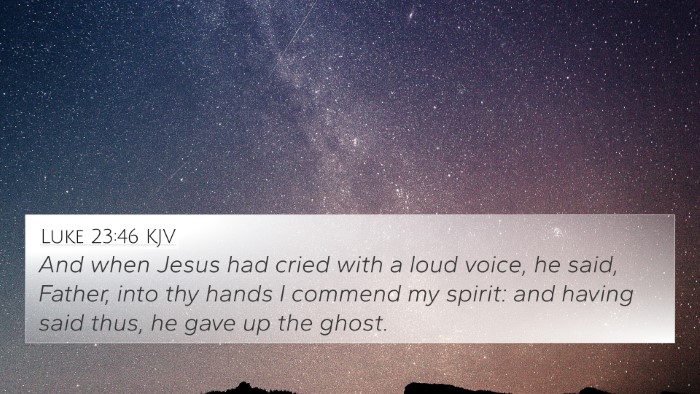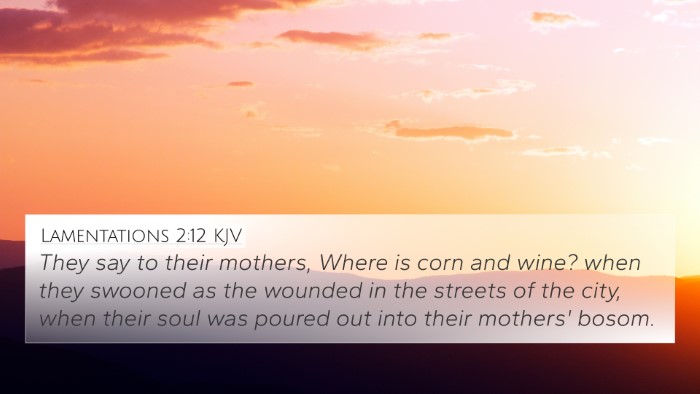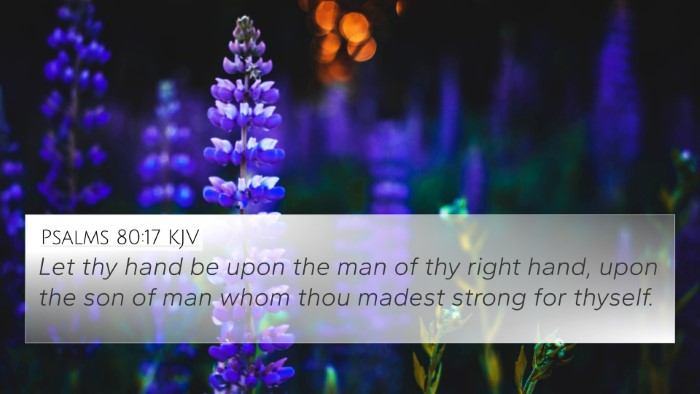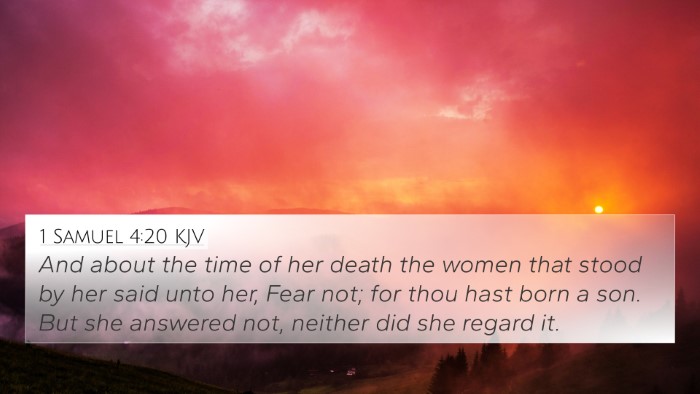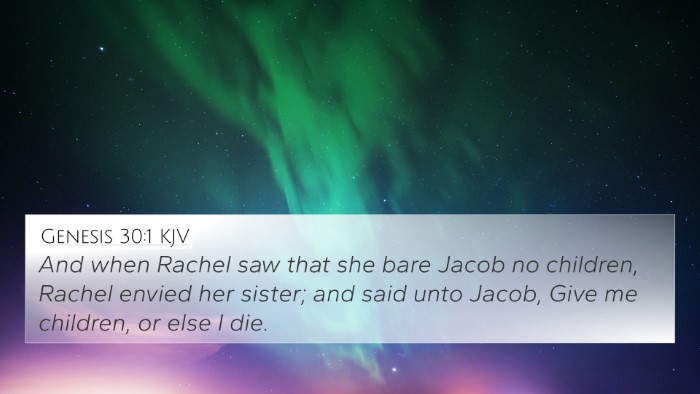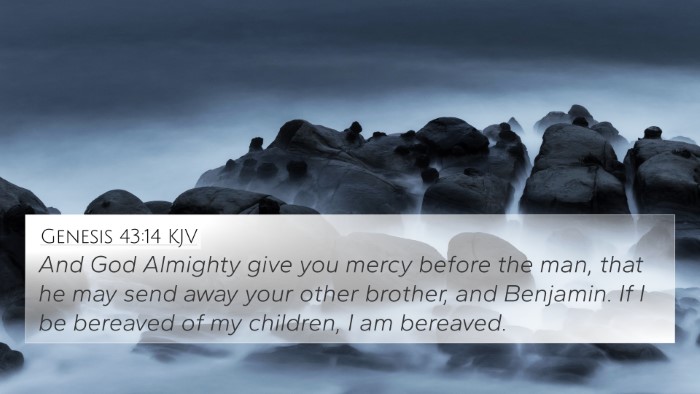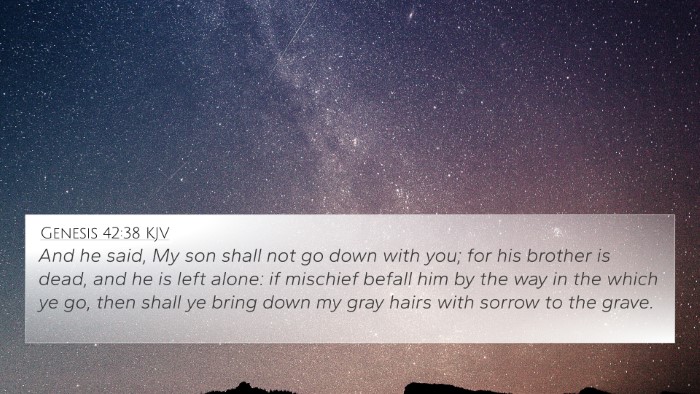Meaning and Interpretation of Genesis 35:18
Genesis 35:18 states: "And it came to pass, as her soul was in departing, (for she died) that she called his name Benoni: but his father called him Benjamin." This verse captures a poignant moment in the life of Rachel, wife of Jacob, as she gives birth to her second son while facing death. The choice of names, "Benoni," meaning "son of my sorrow," and "Benjamin," meaning "son of the right hand," is significant and layered with meaning.
Commentary Insights
The interpretations from public domain commentaries provide depth to our understanding of this verse:
- Matthew Henry: Henry emphasizes the emotional weight of this moment. Rachel's naming of her son as a reflection of her sorrow showcases the pain of childbirth and the profound impact of loss. He underscores that Jacob's renaming to Benjamin signifies not just a shift from sorrow to the blessing of strength, but also the notion of divine favor.
- Albert Barnes: Barnes views the situation as a thematic representation of God's providence amidst human tragedy. The contrast between the two names highlights the tension between loss and legacy. He notes the significance of the name Benjamin, aligning it with Jacob's future and the hope it represents for the lineage of Israel.
- Adam Clarke: Clarke delves into the cultural implications of the names given. He remarks that the name Benoni reflects a mother's immediate emotional response to her plight, while Benjamin embodies Jacob's paternal hope and favorable standing in life. Clarke further elaborates on the prophetic significance of naming within the Hebrew context.
Bible Verse Cross-References
To gain a more comprehensive understanding of Genesis 35:18, it is beneficial to explore its connections with other scripture passages. Here are several relevant Bible cross-references:
- Genesis 30:1: Rachel's earlier struggle with fertility and her deep desire for children sets the stage for this moment.
- Genesis 29:32: The naming dynamics between Rachel and Leah provide insight into their relationship and emotional struggles.
- 1 Chronicles 5:28-29: The genealogy of Benjamin highlights his importance within Israel's history.
- Genesis 48:14: Jacob blesses Joseph's sons, indicating a legacy and significance that carries through to Benjamin's life.
- Romans 9:3-5: This New Testament passage discusses the lineage of Israel, connecting Benjamin to the greater narrative of salvation.
- Deuteronomy 33:12: Here, Moses blesses the tribe of Benjamin, further establishing its significance among the tribes of Israel.
- Matthew 2:18: This verse reflects a theme of sorrow linked with the context of the birth of Christ, mirroring Rachel's mourning.
Thematic Connections and Analysis
The exploration of Genesis 35:18 through the lens of thematic Bible verse connections aids in grasping its deeper meanings:
- Duality of Sorrow and Joy: The naming of Benoni signifies sorrow, whereas Benjamin represents joy and strength, symbolizing life's complexities.
- Divine Intervention: The transition from Benoni to Benjamin reflects God's providential hand in turning sorrow into purpose.
- Significance of Naming: Names in the Bible often carry deep meaning, shaping identity and destiny within biblical narratives.
Tools for Bible Cross-Referencing
Utilizing tools for Bible cross-referencing enhances understanding:
- Bible Concordance: A comprehensive index of biblical terms and themes helps locate relevant verses.
- Bible Cross-Reference Guide: These guides assist in tracing thematic narratives and patterns across scriptures.
- Cross-Reference Bible Study: Engaging in a cross-referenced study encourages deeper exploration of biblical themes and connections.
Conclusion
In conclusion, Genesis 35:18 is not merely a verse about birth; it encapsulates themes of sorrow, hope, and God's overarching plan for His people. The juxtaposition of Benoni and Benjamin poignantly illustrates the interplay between human emotional experiences and divine destiny. By examining this verse through comparative Bible verse analysis and inter-Biblical dialogue, one can unravel the rich tapestry woven throughout scripture that links Old Testament narratives with New Testament revelations.





